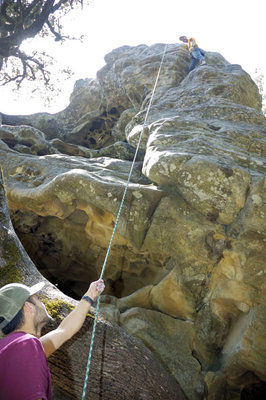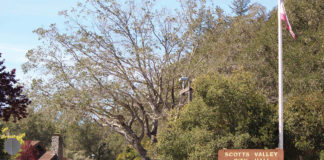
Castle Rock State Park — 5,125 rural acres with 32 miles of hiking and horseback riding trails north of Boulder Creek — is one of 70 California state parks slated for closure in the next several years.
State parks officials announced the closures May 13 as the necessary remedy to reduce the department’s $300 million budget by $11 million during the 2011-12 fiscal year and $22 million the following year, as mandated by Assembly Bill 95, which was signed into law in March.
“We regret closing any park,” said Ruth Coleman, director of California State Parks, in a prepared statement. “But with the proposed budget reductions over the next two years, we can no longer afford to operate all parks within the system.”
In Santa Cruz County, Castle Rock State Park, Twin Lakes and Seabright state beaches, Santa Cruz Missions Historical State Park and Schwann Lagoon State Park will close within the next two years.
Castle Rock will be put into “caretaker status,” said acting Mountain Sector Superintendent Sheila Branon, meaning that instead of having a full-time ranger in the park, there will be regular patrols through park by rangers stationed elsewhere — most likely from nearby Big Basin Redwoods State Park.
“We’ve never closed state parks before in California, so this is new to us,” Branon said. “All parks are different. Castle Rock is so porous, so there’s no way to physically close the park.”
The parks department plans to make sure the park remains safe and will watch for the likes of illegal fires and graffiti.
Branon said revenue and attendance were part of the formula used to determine which parks would close. Castle Rock’s annual revenue was $46,300 in 2008-09, and the park lost $114,000. Attendance that year was just over 82,600.
“They haven’t set a date for closing trail camps,” Branon said of the popular backpacking spot. “We’re predicting after next spring.”
Coleman said the parks system will seek partners among cities, counties and nonprofits to continue to operate the parks, despite the removal of state funding.
The closures come after Proposition 21 — an $18 vehicle license surcharge that would have raised $500 million per year for the parks — failed at the polls in November.
The measure failed statewide, despite 68 percent approval in Santa Cruz County.
It’s a sad day for state parks and the recreating public,” Branen said. “Everyone’s upset about this. We’re hoping something changes.”
Groups that support state parks also regret the news.
“Even though we’ve been preparing for this news, it’s a very sad day for California,” said Bonny Hawley, the executive director of Friends of Santa Cruz State Parks, in a statement. “We’re especially disappointed to see local treasures on the list. … We should be asking, ‘Is this the kind of state we want to be living in?’ Until we have a better answer to that question, Friends of Santa Cruz State Parks is prepared to step up in new ways to save these parks and beaches for future generations, as they were saved for us.”
The Mountain Parks Foundation, www.mountainparks.org, is an avenue that park lovers can use to donate to help support programs in the parks.












